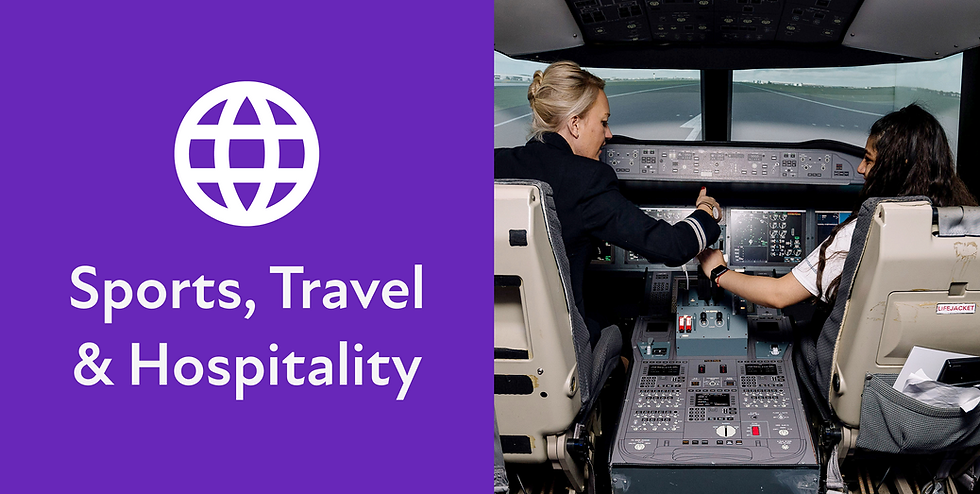Turn Your Passion for Sport and Travel into a Career
- Career blog

- Jul 30, 2025
- 5 min read
Updated: Nov 25, 2025
Do you love sport, travel or meeting new people? Careers in Sports, Travel & Hospitality could be your ticket to working in dynamic, high-energy environments – whether it’s running events, creating great guest experiences, organising trips or working behind the scenes in a sports organisation.
In this guide we’ll dive into what these careers involve, the skills employers are looking for, typical salaries, and how you can get started with exciting work experience opportunities through Futures For All.

What Are Sports, Travel and Hospitality Careers?
The sectors of sports, travel and hospitality span a wide range of jobs – from organising sporting events and working in hotel and resort management, to operating travel agencies, guiding tours and supporting leisure activities.
If you thrive under pressure, enjoy working with people, and love the idea of travel, live events or guest-services, then a career in these areas could suit you well. Roles may be local or global, customer-facing or behind the scenes –offering lots of variety and routes in.
Five Facts About Sports, Travel and Hospitality Careers
Massive Employment Sector: Major Employment Scale: The UK’s leisure and tourism industry is expected to support 3.8 million jobs in 2025, accounting for around 11.9% of all jobs.
Hospitality as a Key Employer: The hospitality sector employs around 3.5 million people in the UK and contributes about £93 billion annually to the economy.
Sports Sector Size: The sports and physical activity sector employs around 878,000 people (3.5% of the UK workforce) and has high levels of part-time and self-employment.
Seasonal and Experience-Rich Roles: Many jobs in travel, hospitality and sports are seasonal, guest-centred and experience-driven – presenting excellent opportunities for young people, especially in events and hospitality settings.
Digital and Customer Skills Rising in Demand: With growth in travel tech, e-tourism and hospitality digital services, roles increasingly require strong digital, customer-service and event-management skills.
Key Career Areas in Sports, Travel and Hospitality Careers
The sector spans many specialisms – below are some common routes you might explore:
Sporting Events and Leisure Management
Roles include events coordinator, sports venue manager, fitness club operator or tournament planner.
If you’re passionate about sport, teamwork and live events, this path puts you at the heart of action and experience creation.
Travel and Tourism Services
Jobs include travel consultant, tour guide, travel operations manager or airline customer-service specialist.
For those who love exploring, planning logistics and helping people make memories, travel roles offer global reach – and often adventure.
Hospitality and Guest Services
Roles might be hotel manager, resort operations assistant, front-of-house supervisor, catering events lead or hospitality sales executive.
Hospitality is all about delivering memorable experiences – with strong customer service, adaptability and service mindset at the core.
Accommodation and Tourism Logistics
This area includes tourism support planner, accommodation manager, leisure-activities organiser or travel logistics coordinator.
Behind every guest stay, trip or event is a logistic and operations engine – many roles here focus on organisation, efficiency and guest satisfaction.
Sports and Hospitality Business Relations
Roles include corporate hospitality executive at sports venues, sponsorship manager, tourism-sports partnership lead or guest-experience director.
When sport, travel and hospitality intersect, you get unique roles combining event, brand and guest experience – perfect for those who thrive at the intersection of business and service.
Sports:
Travel:
Hospitality:
Watch more career videos here.
What Are the Salary Expectations?
Salaries differ widely depending on role, experience and region, but here are some indicative of the salary range you could see in the UK:
Role | Starting Salary | Experienced Salary |
Barrister | £21,000 | £200,000 |
Care Worker | £20,000 | £25,000 |
Clinical Psychologist | £48,000 | £63,000 |
Equalities Officer | £22,000 | £45,000 |
Family Support Worker | £28,000 | £58,000 |
Judge | £101,000 | £295,000 |
Nursery Worker | £16,000 | £24,000 |
Social Worker | £32,000 | £48,000 |
If your dream job isn’t listed over check the National Careers Service to gain a deeper insight.
The Skills You’ll Need for Law, Care and Community Careers
These careers require both soft skills and professional knowledge, since much of the work involves people, emotions, and ethical decision-making.
Core Creative/Professional Skills
Communication & active listening
Critical thinking and judgement
Organisation & time management
Confidentiality and discretion
Empathy and resilience
Interpersonal skills
Building trust and relationships
Managing conflict sensitively
Cultural awareness and inclusivity
Compassion and emotional balance
Technical and Digital Skills
Case management and record systems (e.g., NHS, legal CRM)
Report writing and digital documentation
Understanding of privacy, data and safeguarding policies
Work Experience in Sports, Travel & Hospitality: A Case Study
High-flying work experience with Virgin Atlantic

Virgin Atlantic worked in close partnership with Futures For All to deliver a year-long Passport to Change programme. It showcased careers in the world of aviation to 300 Year 8 students from partner schools in Crawley and Swansea, as well as 100 young people from Atlanta, Georgia.
“Over a 12-month period, the young people took part in 25,000 hours of hands-on learning – which included inspiring talks, interactive activities, and mentoring, both remotely and in-person. The project culminated with young people applying what they had learnt to present ideas for their own airlines to a panel of judges.” – Laura Macshane, Manager, DEI & Community, Virgin Atlantic
How to Start a Career in Sport, Travel and Hospitality
Explore your interest – Do you love travel, guest service, events, sport, logistics or social experiences?
Get experience – Look into student work, summer roles in hotels, events volunteering, travel agency admin or sports club operations.
Build skills and qualifications – Relevant courses: hospitality & tourism diplomas, certificate in event management, sports management, travel & tourism qualifications.
Network and immerse yourself – Attend careers fairs, hotel/venue open days, event-industry workshops, join travel club societies, shadow operations.
Stay flexible and niche-focused – Specialise in events, luxury hospitality, sports tourism or travel operations – these niches often allow progression and stronger earnings.
Next Steps
If you’re ready to explore a career in Sports, Travel or Hospitality, check out the Futures For All Work Experience Finder.
Quick answers to your FAQs
Do I need a degree to work in sports, travel or hospitality?
Not necessarily. Many roles offer entry through vocational training, apprenticeships, diplomas or direct experience. Practical skills and guest-service ability often matter more than formal qualifications.
What subjects should I study to help in this sector?
Good choices include Hospitality & Tourism, Sport & Exercise Science, Event Management, Travel & Tourism, Business Studies, and IT – these help build service, operational and digital skills.
Are jobs in this sector seasonal or full-time?
Both. The travel, sport and hospitality sectors offer a mix of full-time, part-time and seasonal work (e.g., summer resorts, sports seasons). Many early roles are casual but can lead to permanent career progression.
Interested in mentoring? Find out more here.
Need access to a library of resources about different sectors? Click here.
Find out more about apprenticeships here.
Discover University pathway here.
This blog is a guide, and careers are constantly changing. Please check the National Careers Service website for the latest information and all the qualifications needed, and the GOV.UK website for more on T-levels. For careers advice in all parts of the UK, visit: National Careers Service (England), nidirect (Northern Ireland), My World of Work (Scotland) and Careers Wales (Wales)



